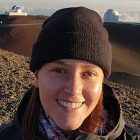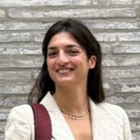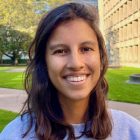MIT Postdoctoral Fellowship Program for Engineering Excellence
Outman Akouissi is a School of Engineering Distinguished Postdoctoral Fellow in mechanical engineering whose research is focused on translational bioelectronics, with an emphasis on minimally invasive technologies such as ingestible and wearable medical devices. As a doctoral student, Outman developed novel peripheral nerve implants for advanced neuromodulation therapies, coinvented hydrogel-based actuation and thin-film 3D microelectrode arrays for neural spheroid electrophysiology, and contributed to the development of integrated wearable systems for the restoration of biomimetic thermal sensations in the phantom hands of amputees. His postdoctoral fellowship will enable him to pursue cutting-edge research in the field of ingestible electronics, specifically a swallowable pill-like device that, once ingested, can modulate the activity of the small intestine, leveraging advanced microfabrication, innovative materials, and creative electromechanical engineering. Outman’s innovative work has the potential to revolutionize patient care, offering personalized treatments for conditions affecting the gastrointestinal tract as well as the nervous system via the gut-brain axis. His ultimate goal is to develop innovative minimally invasive technologies with a focus on clinical translation and lower-cost solutions for deployment in the developing world.
https://engineering.mit.edu/wp-content/uploads/2025/01/Akouissi-Outman_PFPEE_2024-2026_photo.jpg
Website
Outman Akouissi
Mechanical Engineering https://engineering.mit.edu/fellows/outman-akouissi/Sofia Arevalo is a School of Engineering Distinguished Postdoctoral Fellow whose research uses experimental and computational methods to assess and develop novel biomaterials for use in tissue engineering. Her doctoral research explored a family of polymers with useful attributes that could enhance function and longevity in the body. Sofia’s work demonstrated the validity of using nano-indentation for characterizing medical-grade polymers, and her insights into the nano-mechanical properties of these materials could improve the design and function of long-term structural applications and broaden our understanding of the mechanics of other bio-inspired systems. As a postdoctoral fellow, she is utilizing molecular dynamics and machine learning to gain insights into the binding affinity of metal-protein complexes for the development of novel self-healing materials for tissue engineering. Sofia’s goal is to develop nano-mechanical techniques to investigate the degeneration and progression of diseases, such as osteoarthritis and cancer, and to develop a technique to measure and model the interfacial bond strength of composites. Sofia’s innovative work has important implications in several fields, including engineering materials, polymer mechanics, materials characterization, and implant design. Her future work holds the potential to support exciting advances in materials science, biomechanical engineering, and clinical medicine.
https://engineering.mit.edu/wp-content/uploads/2023/02/Arevalo.jpg
Website
Sofia Arevalo
Civil and Environmental Engineering https://engineering.mit.edu/fellows/sofia-arevalo/Moala Keshei Bannavti is a Department of Civil and Environmental Engineering Distinguished Postdoctoral Fellow whose research aims to address environmental injustice and inequities through interdisciplinary environmental science. Specifically, Bannavti’s doctoral work focused on air quality in public schools — an understudied part of the built environment — and developing new approaches to remediate airborne, semivolatile organic compounds in low-income, minority-predominant public schools. As a postdoc, she will continue her explorations of polychlorinated biphenyls (PCB) emissions, which have been linked to many diseases, including diabetes, respiratory diseases, and neurodevelopmental disorders, with a focus on the contamination of outdoor air surrounding Superfund sites like the Neponset River.
https://engineering.mit.edu/wp-content/uploads/2024/03/Bannavti.jpg
Website
Moala Keshei Bannavti
Civil and Environmental Engineering https://engineering.mit.edu/fellows/moala-keshei-bannavti/Elana Ben-Akiva is an MIT-Northpond Distinguished Postdoctoral Fellow whose research focuses on leveraging biomaterials engineering approaches to activate or suppress the body’s natural defense mechanisms to treat various diseases, including cancer and infectious diseases. The primary aims of her postdoc research will be to investigate saponin-based nanoparticle adjuvants in combination with toll-like receptor agonists and engineering novel adjuvants for HIV vaccination and to develop lipid nanoparticles with enhanced adjuvant activity and delivery properties to improve the efficacy of RNA-based HIV vaccines and cancer immunotherapies.
https://engineering.mit.edu/wp-content/uploads/2024/03/Ben-Akiva.jpg
Website
Elana Ben-Akiva
Biological Engineering https://engineering.mit.edu/fellows/elana-ben-akiva/Shaniel Bowen is a School of Engineering Distinguished Postdoctoral Fellow whose research concerns the pathogenesis, diagnosis, and treatment of pelvic floor disorders and, more broadly, improving women’s health and health equity. In her doctoral research, Bowen designed a study on racial disparity in women’s health research, characterizing age and racial diversity in normal pelvic anatomy in adult women and beginning to build an open-access repository of demographic/MRI data of a diverse cohort. Ancillary analyses of this study population led to her foundational studies of the clitoris and its correlation with sexual function in patients after vaginal surgery. As a postdoc, Bowen will continue to study the clitoris and its supporting structures in diverse populations.
https://engineering.mit.edu/wp-content/uploads/2024/03/Bowen.jpg
Website
Shaniel Bowen
Institute for Medical Engineering and Science https://engineering.mit.edu/fellows/shaniel-bowen/Paula Cárdenas-Hernández is a School of Engineering Distinguished Postdoctoral Fellow in civil and environmental engineering. In her doctoral work, Paula investigated the degradation of anthropogenic contaminants, such as explosives, in soils and groundwater and developed predictive models for their breakdown under natural and remediation conditions. Her research will focus on how plants and microbes increase the availability of critical nutrients in soils. Specifically, she will investigate how redox-active metabolites released by plant roots affect microbial activity and the availability of iron and phosphorus in soils. Her postdoctoral fellowship will enable her to continue improving our understanding of the naturally occurring processes that control nutrient cycling and contaminant attenuation in soils and groundwater. If engineered appropriately, this knowledge could lead to the development of technologies that enhance fertilizer efficiency and help decrease the impacts of agriculture and other industries on the environment.
https://engineering.mit.edu/wp-content/uploads/2025/01/Cardenas-Hernandez-Paula_PFPEE_2024-2026_photo.jpg
Website
Paula Cárdenas-Hernández
Civil and Environmental Engineering https://engineering.mit.edu/fellows/paula-cardenas-hernandez/Molly Carton is a School of Engineering Distinguished Postdoctoral Fellow whose research interests lie at the interface of computational design of materials, fabrication, and robotics. She uses algorithmic design and computational fabrication to generate architected materials and mechanisms with new mechanical properties and to explore how those properties can be deployed to create sensors, actuators, and robotic and deployable systems. Her research includes designing scalable simulation techniques to understand the properties of these materials and structures within tractable limits of time and computation resources. Her work on computational geometry and the development of machine-controlled fabrication processes have led her to explore the larger challenge of creating frameworks for next-generation fabrication tools. Molly’s work has the potential for a major impact on materials design and fabrication and could advance the use of architected materials with valuable properties, from soft robots and shape-morphing 4D printed structures that can be manufactured on demand and deployed at record speed to medical devices that are tailored to the individual patient.
https://engineering.mit.edu/wp-content/uploads/2023/02/Carton.jpg
Website
Molly Carton
Mechanical Engineering https://engineering.mit.edu/fellows/molly-carton/Sara Cerasoli is a School of Engineering Distinguished Postdoctoral Fellow in civil and environmental engineering specializing in natural climate solutions and ecohydrology. Her research focuses on optimizing soil, plant, and water resources for climate change mitigation while addressing the interconnected challenges of food security, ecosystem preservation, and water scarcity. Sara’s work integrates ecohydrology, economic modeling, dynamical systems theory, stochastic processes, and optimization methods to tackle complex natural-human system interactions. Her doctoral research examined the biophysical impact of reforestation on cloud formation, water management for agroecosystems, and building natural climate solutions portfolios to maximize the carbon benefit. As a postdoctoral fellow, Sara will advance our understanding of land-atmospheric feedback in natural climate solutions, analyzing their impact on carbon and water cycles and developing optimal policies that harmonize water conservation, food production, and carbon mitigation strategies. Her multidisciplinary approach aims to provide clear definitions of ecohydrological regions suitable for natural climate solutions projects and support effective environmental policymaking.
https://engineering.mit.edu/wp-content/uploads/2025/01/Cerasoli-Sara_PFPEE_2024-2026_photo.png
Website
Sara Cerasoli
Civil and Environmental Engineering https://engineering.mit.edu/fellows/sara-cerasoli/Steven Ceron is a School of Engineering Distinguished Postdoctoral Fellow whose research interests encompass the design, fabrication, and control of robot swarms at the macro- and micro-length scales. His doctoral research focused on simulation and physical implementations of macro-scale and micro-scale robot swarms and explored how interactions between agents’ physical features and their surrounding environment could be exploited to enable navigation, object manipulation, and dispersion. His postdoctoral research concentrates on developing a self-reconfigurable, modular robot swarm that enables reconfiguration, manipulation, and distributed sensing. Steven’s objectives include exploring how a structure could form itself from robotic building blocks, with the capacity to adjust and repair itself in response to changes in the surrounding environment. This work is a crucial step in the long-term vision of swarm robotics and modular self-reconfigurable robots. Steven’s self-reconfigurable robot swarm and its distributed coordination schemes offer valuable insights for the general robotics community and hold great potential for diverse applications, including biomedicine, exploration of hard-to-reach environments, and autonomous robot collective construction.
https://engineering.mit.edu/wp-content/uploads/2023/02/Ceron-1.jpg
Website
Steven Ceron
Electrical Engineering and Computer Science https://engineering.mit.edu/fellows/steven-ceron/Juan Cervino is an MIT-IBM Distinguished Postdoctoral Fellow in electrical engineering whose research is focused on developing intelligent systems that are efficient under scale, robust to perturbations, and flexible to heterogeneity. Specifically, Juan’s work concentrates on the introduction of requirements to perform machine learning over graphs. As a doctoral student, Juan’s notable achievements included the development of a methodology to train graph neural networks on a sequence of growing graphs that converge to the limit architecture (the graphon) and a novel approach to learning smooth functions over the underlying low-dimensional representation of the data (the manifold). With the support of a postdoctoral fellowship, Juan will pursue several areas of inquiry, including new approaches to large-scale continual learning problems, utilizing manifold smoothness to optimize learning-for-control, and finally, expanding our understanding of collaborative solutions under heterogeneity for the purposes of developing methods of jointly learning shared solutions that improve all the agents in a network. Juan’s innovative research has strong potential to advance the field of machine learning and help deliver next-generation intelligent systems with greatly improved efficiency, strength, and flexibility.
https://engineering.mit.edu/wp-content/uploads/2025/01/Cervino-Juan_PFPEE_2024-2026_photo.jpg
Website
Juan Cervino
https://engineering.mit.edu/fellows/juan-cervino/Mohammad Charara is a School of Engineering Distinguished Postdoctoral Fellow in mechanical engineering whose research explores the mechanics of topological metamaterials with the aims of expanding the design space of these metamaterials, understanding how their mechanics translate into realistic structural specimens, and elucidating their special wave-control properties. In his doctoral research, Mohammad expanded the field on multiple fronts by developing realistic structural lattices that can be physically fabricated, exploring their deformation in 3D, and addressing the dynamical behavior of these materials, particularly with respect to their ability to manipulate acoustic waves. Supported by a postdoctoral fellowship, Mohammad will leverage his expertise and unique perspectives in metamaterials, dynamical systems, and wave propagation to study the mechanics of lattice materials at the nano- and microscales. Mohammad’s work, which applies the latest advances in material physics and topology, has the potential to improve our understanding of the mechanics of metamaterials and deliver new structural materials with broader and superior functionalities.
https://engineering.mit.edu/wp-content/uploads/2025/01/Charara-Mohammad_PFPEE_2024-2026_photo.jpg
Website
Mohammad Charara
Mechanical Engineering https://engineering.mit.edu/fellows/mohammad-charara/Matthew Clarke is an MIT-Boeing Distinguished Postdoctoral Fellow whose research focuses on aircraft design, aerodynamics and aeroacoustics, and the optimization of electric vehicles for regional and urban air mobility (UAM). As a doctoral candidate, Mathew worked on synthesizing a multi-fidelity approach for predicting the performance and acoustic footprint of electric short/vertical takeoff and landing aircraft (eS/VTOLs), balancing fast, iterative design with high-resolution analyses within the flight profile. As a postdoctoral fellow, he will build upon this work in three areas: aerodynamic and aeroacoustic optimization of UAM Vehicles; lithium-ion battery modeling for aerospace applications; and addressing the challenges of future aviation policy and air traffic control. Through his research, Matthew is bridging the gap between aircraft conceptual design and electrochemical cell (power sources) modeling and tackling systems-level challenges such as the integration of eS/VTOLs and UAM vehicles into existing transportation infrastructure. His work holds tremendous promise to advance UAM technology and aerospace engineering. In addition, he is developing innovative techniques, including multi-fidelity techniques, high-fidelity numerical simulations, quantification of uncertainties in the design, and high-dimensional mathematical optimization, that will support cutting-edge research in many domains.
https://engineering.mit.edu/wp-content/uploads/2023/02/Clarke.jpg
Website
Matthew Clarke
Aeronautics and Astronautics https://engineering.mit.edu/fellows/matthew-clarke/Farhana Easmin is an MIT-Northpond Distinguished Postdoctoral Fellow in genomic engineering whose work is focused on genome editing and explorations of genome function and breeding, with the goal of building creative solutions to environmental and human health challenges. In her doctoral research, Easmin developed rapid and versatile genome editing tools for the creation of genome diversity in yeast. As a postdoc, Easmin will apply her experience in yeast genome engineering to environmental bioremediation, specifically the bioremediation of heavy metals and PFAS.
https://engineering.mit.edu/wp-content/uploads/2024/03/Easmin.jpg
Website
Farhana Easmin
Biological Engineering https://engineering.mit.edu/fellows/farhana-easmin/Suhas Eswarappa Prameela is a Department of Aeronautics and Astronautics Distinguished Postdoctoral Fellow specializing in the advancement of metallic and ceramic materials for extreme dynamic environments. Their research combines high-throughput experiments, advanced manufacturing techniques, and innovative alloy design methods to engineer resilient materials tailored for applications such as space structures and reusable rocket engines, ensuring their durability in high-temperature, shock-prone, and diverse extreme conditions. Suhas’s work holds the promise to revolutionize space exploration, bolster defense capabilities, and transform transcontinental earth-to-earth travel. Utilizing cutting-edge thermo-mechanical processing and additive manufacturing, Suhas’s research goal is to design materials crucial for a safer and more sustainable future, pushing the boundaries of materials science to enable humanity’s progress on the challenging frontiers of space and beyond.
https://engineering.mit.edu/wp-content/uploads/2023/02/Prameela.jpg
Website
Suhas Eswarappa Prameela
Aeronautics and Astronautics https://engineering.mit.edu/fellows/suhas-eswarappa-prameela/Amy Rae Fox is a METEOR and School of Engineering Distinguished Postdoctoral Fellow whose research centers on the role of cognition in information visualization and diagrammatic reasoning. At MIT, Amy is investigating interactive visualization to address a central challenge in visualization research and design: the common belief that extracting insights from visual data is easy when, in fact, we rely on years of explicit training and implicit exposure. Amy’s doctoral research examined the integration of perceptual and knowledge-driven processing in graphical discovery—an often-neglected stage of graph comprehension that characterizes how humans construct meaning for unfamiliar graphs. The goal of her postdoctoral work is to lay the groundwork for a generalized theory of interaction through mixed-method research. This theory will support her future efforts to leverage what we know about human cognition when building information systems and artifacts and, conversely, to study their everyday use to advance theories of human cognition. As visualization becomes a central medium for communication and decision-making, Amy’s work has the potential for significant social impact, from scientific research and data analysis to personal decisions about our health and well-being.
https://engineering.mit.edu/wp-content/uploads/2023/02/Fox.jpg
Website
Amy Rae Fox
Electrical Engineering and Computer Science https://engineering.mit.edu/fellows/amy-rae-fox/Michael Hagenow is an MIT-Boeing Distinguished Postdoctoral Fellow whose research focuses on creating effective and flexible systems for human-robot teaming across a range of applications, with a particular interest in methods for shared autonomy and robot skill acquisition. In his doctoral research, he investigated new approaches for robot behavior acquisition. As a postdoc, Hagenow will continue to pursue innovative techniques that combine iterative learning and human‐in‐the‐loop interactions to further the adoption of collaborative robots.
https://engineering.mit.edu/wp-content/uploads/2024/03/Hagenow.jpg
Website
Michael Hagenow
Aeronautics and Astronautics https://engineering.mit.edu/fellows/michael-hagenow/Alvin D. Harvey is an MIT-Boeing Distinguished Postdoctoral Fellow and a citizen of the Navajo (Diné) Nation who is focused on Indigenous research methodologies and methods in aeronautics engineering. Alvin’s doctoral thesis was shaped by several goals: co-creating and applying Diné and Indigenous pillars of knowledge in aeronautics and astronautics; developing Indigenous space ethics, astrophilosophy, astrobiology, and shared engineering methodology; and capacity building and pathfinding in systems and complex theory, curriculum design, and bioastronautics. A postdoctoral fellowship will support Alvin’s ongoing work to develop a technical and communicative craft that speaks to the potential academic, strategic, and innovative partnerships between the space community and Native American and Indigenous communities. His objectives include centering Indigenous systems theory and knowledge in sustainable human and satellite space systems engineering, developing the first Indigenous space conference, and training a research team for a space analog mission grounded in Indigenous methodologies. Alvin’s groundbreaking work has the potential to bring innovative practices and transformational knowledge to aerospace engineering and disciplines across science and engineering.
https://engineering.mit.edu/wp-content/uploads/2025/01/Harvey-Alvin_PFPEE_2024-2026_photo.jpeg
Website
Alvin D. Harvey
Aeronautics and Astronautics https://engineering.mit.edu/fellows/alvin-d-harvey/Ronald Henry Heisser is a School of Engineering Distinguished Postdoctoral Fellow in biohybrid robotics whose work integrates his interests in mechanics and design to study and rationalize machine design principles for systems that bridge micro- and macro-scales. Heisser’s doctoral work centered on using combustion to produce high-power motion in millimeter-scale soft actuators, ultimately enabling him to develop a novel, refreshable Braille display system that is potentially more compact and lower cost than existing Braille technologies. As a postdoc, he will focus on the development of new mechanical components for micro-actuation systems and stretchable interfaces.
https://engineering.mit.edu/wp-content/uploads/2024/03/Hessier.jpg
Website
Ronald Henry Heisser
Mechanical Engineering https://engineering.mit.edu/fellows/ronald-henry-heisser/Juanita Hidalgo is a School of Engineering Distinguished Postdoctoral Fellow whose research is focused on materials for photovoltaic and other optoelectronic applications for sustainable energy. As a doctoral candidate, Hidalgo studied hybrid halide perovskite thin films, which are of interest for use in solar cells, and developed deep expertise in the structure at the surface and bulk of lead halide perovskites using different in-situ X-ray scattering techniques. This work yielded valuable new insights into perovskite solar cells and will have a notable impact on efforts to commercialize this emerging solar cell technology. In her postdoc research, she will apply her expertise in in-situ X-ray characterization to the exploration of other electrochemical materials and interface systems relevant to sustainable energy.
https://engineering.mit.edu/wp-content/uploads/2024/03/Hidalgo.jpg
Website
Juanita Hidalgo
Materials Science and Engineering https://engineering.mit.edu/fellows/juanita-hidalgo/Timothy Holder is an MIT-IBM Distinguished Postdoctoral Fellow whose research lies at the intersection of psychophysiological engineering and affective computing. Specifically, Timothy is working to develop wearable, noncontact, and remote psychophysiological sensor systems for use in a wide range of dyadic, affective, and citizen science contexts. The aim of these systems is to quantitatively detect the psychophysiological states of humans and animals as they interact to form relationships and mutually beneficial bonds. Potential applications include canine-assisted therapies, human-robot interactions, telehealth, and monitoring/assessment of cancer fatigue, PTSD-related events, and autism-related issues. His postdoctoral research explores several new avenues, including achieving higher resolution in psychophysiological indicators of specific dyadic interactions such as student-teacher and employer-employee; adapting multimodal systems to various animals (dogs, horses, etc.); and actualizing telemedicine interventions. Timothy’s work has exciting potential to advance our understanding of causal attribution (connecting environmental and interaction inputs directly to mental, emotional, or physical outputs) and could be applied to support improved health and relationships in a wide variety of human-other contexts.
https://engineering.mit.edu/wp-content/uploads/2023/02/Holder-1.jpg
Website